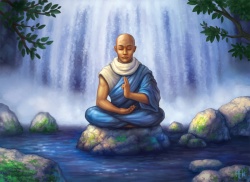Nirvana, Being, The Self and Buddhist Consciousness
Nirvana , the ultimate goal of every Buddhist, has been described various ways, including:
- 1) "a cosmic state that pervades the universe which everyone must link up with";
- 2) "the permanent unconditioned being";
- 3) "a state of bliss that one reaches when they escape from the bonds of the material world"; and
- 4) "the result of transmigration of the soul from the self and the state of suffering into oneness with the universe."
Nirvana comes from the Sanskrit word for "blowing out." The sutras of Buddha describe it as a state free from greed, anger, ignorance and various other "fetters" of everyday life. Once a person reaches nirvana there is no need to be reborn and the process of reincarnation ends.
Most Buddhists realize that attaining nirvana is unrealistic for now and simply aim for a “better” existence. They think they are unworthy of nirvana and simply aim to improve their lot by earning merit, aiming for higher levels in their next life and reducing the number of rebirths they have to go through.
Scientist tend to view the mind as a function of the brain while Buddhists tend to see it as expression of a consciousness that can be reincarnated over lifetimes and shaped by karma|karmic destiny. Another key Buddhist idea is the notion that we can change our world by changing how we choose to look at the world.
According to Buddhism:
- 1) people do not possess an unchanging self but are rather empty vessels through which experiences pass.
- 2) Being is existence in a cycle that is not created or destroyed but continues until the cycle is broken.
- 3) consciousness is a stream that flows from life to death to rebirth in a continuous flow. Reincarnation itself is not seen as a form of transcendence but is rather viewed as a stage in a continuous process.
In his first sermon, Buddha said, “being dispassionate, he becomes detached; through detachment he is liberated. When liberated there is knowledge that he is liberated, and he knows: birth is exhausted, the whole life has been lived , what has to be done is done, there is no more to be done on this account.”
Source
by Jeffrey Hays
factsanddetails.com
